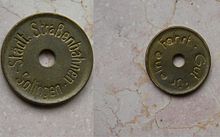Token
As a token or token is called private substitute money of base metal or substitutes.
Tokens
Tokens or private substitute money ( money substitutes ) are made from base metals or substitute materials (leather, wood, ceramics, hard rubber, plastic) and can be exchanged for services or goods. They did not come into use until the 19th century and certain types of these marks are still in use in some countries to this day. In the English-speaking world, tokens are called tokens , in France Méreaux and in Spanish-speaking countries fichas or boletos . Goal brands and bread pennies are also included. Some of them come as a ticket for use (eg. As New York City Subway , Metro Istanbul , Saint Petersburg Metro ). Originally one spoke here of a tram coin . In Hamburg z. B. 1923 ceramic fare stamps ( Bottgerzeug ) issued. In Italy special coins ( gettoni ) were used for public telephone boxes. In the 18th and 19th centuries, some cities issued tokens in times of need, especially after bad harvests, in order to subsidize the need for bread to buy (for example the Cologne "Brodtpfenninge" from the years 1739/40 and the "Brodmarke" from Jakob's Aders initiated the "Elberfelder Kornverein" from the years 1816/17). In the private sector, they belonged to the so-called truck system , in which wages were sometimes not paid in money but in tokens in order to force purchases from employers. These include, for example, the Veilsdorf copper brands .
Use of tokens in South America and India
In South America, wages in saltpeter works, mines and haciendas were paid in the form of tokens (ficha salario). These brands could only be used in the shops ( pulperías ) belonging to the companies . Tokens (boleto) were used in a similar manner in the coffee plantations of Central America ( Costa Rica , El Salvador and Guatemala ) and in tea plantations in India. Forerunners of these tokens in Spanish America in the 18th and 19th centuries were the tokens in metal or cardboard, which were given out by dealers instead of change and were called mitades or señas .
Types of tokens
Tokens can be divided into two groups:
- 1. Tokens that have an imprinted value in the currency of a state:
- 2. Tokens that have no particular value and can be exchanged for goods or services:
- Tokens for transport by bus, subway or ferry (also for free travel for the severely disabled)
- Tokens for telephone calls ( telephone ticket )
- Tokens (mostly made of plastic) as a ticket on rides
- Tokens for drinks or food (e.g. beer or canteen tokens)
- Tokens for slot machines
- Tokens for washing machines in communal laundry rooms
- Tokens for public baths (e.g. shower tokens )
- Parking tokens
See also
literature
- Menzel, Peter: German emergency coins and other money substitute stamps 1840-1990 . 2 volumes, Münzhandel and Verlag B. Strothotte, Gütersloh, 1993.

